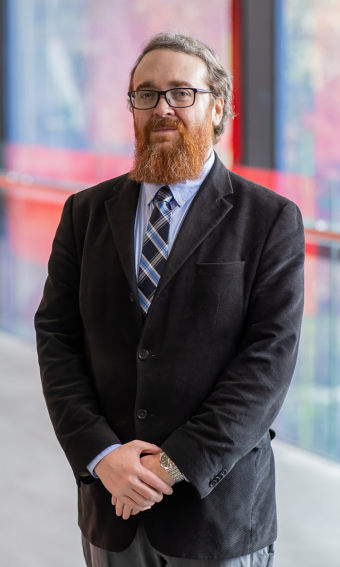Transcending technical mastery – Transforming our educational culture – UNSW Civil & Environmental Engineering shares its visionary blueprint
Mary O'Connell | School of Civil and Environmental Engineering
The School of Civil and Environmental Engineering (CVEN) at UNSW has set out its visionary plan for championing “Ethical Civil Infrastructure and Sustainable Environments” with the publication of a Vision Document.
One of the School’s main aims is to support a cultural shift within engineering education and the relevant engineering professions –emphasising a value on the ethical rather than solely technical consideration. As CVEN Head of School, Professor Travis Waller, says “we should not define our self-worth as engineers purely from technical mastery.”
Waller is one of the four authors of the Vision Document – his co-authors are Professor Robert Care - Chair of RedR Australia– the engineering humanitarian response agency, Dr Kourosh Kayvani, a Board Director of Engineers Australia, and Professor Lucy Marshall, Associate Dean (Equity and Diversity),UNSW Engineering.
"I want to stress, " says Waller, "that our School is already a champion of ethical engineering. Our main message is that the world is quickly growing more complex, and we need to ensure we equip our students with ever more nuanced ethical skills to navigate the increasingly challenging landscape."
Continuing leadership – beyond domain-specific knowledge
CVEN has long been ranked as the number one School of its kind in Australia and is globally placed in the world’s top twelve for civil engineering (AWRU & QS Rankings). With a well-earned reputation of educational and research excellence, and with seven decades of experience in both, it is large by national and international norms, even in the Covid-era, with over 3300 students enrolled in its programs in 2020.
The School has always been real-world focused. Each year CVEN staff and students work with over 100 industry and government organisations on specific industry and community-related projects. The current Vision Document has the same broad sweep of perspective – it seeks to transform both engineering education and praxis.
It is important, its authors note, to fully appreciate that professional decisions are not constrained to highly formalised narrow technical tasks (i.e., “Am I using the correct formulae and method in designing the bridge?”).
Professional decisions and practitioner judgements expand much more broadly than that. The modern problems of humanity that call for engineering solutions are increasingly complex and multifaceted involving conflicting demands.
Ethical practises and skills require support
The Vision Document notes that recent problems arising in the building and construction industry are evoking regulatory responses from various governments in Australia. Legislative responses are commonly introduced when ethical practices have eroded or failed.
Specifically, its authors note, “we want to advocate that skills related to reflecting and communicating on ethical considerations while utilising domain-specific technical skills are vitally important. Such a view requires that as educators and professionals we move past an emphasis on purely domain-central technical skills alone.”
Civil infrastructure and the environment are both characterised by the inescapable reality of being shared and sharing systems. This gives additional nuance to the ethical consideration that come into play, as engineering social responsibilities encompass far more than the legal contract and project brief between practitioner and client.
The Vision Document notes that ethical decision making goes beyond what is legal, acceptable or common. Something may well be legal but still be unethical depending on a particular viewpoint (for example the interaction of aquifers and agriculture, etc). An ethical professional decision is not merely based on what is allowed and/or technically valid, but also what is judged to be right and fair. Most critically, the deliberation must be conducted at the onset where it can influence decisions not after the fact to simply provide excuses.
Ethics in engineering education
The Document authors acknowledge that Universities have a responsibility to shape the engineering profession by fostering an ethical culture throughout an engineer’s academic training, that can then follow through their progression in the profession.
There are three critical engineering educational goals related to ethics:
- Skills/Expertise – the underlying intellectual basis for discerning between what is ethical and what is not. It is important to note that the relevant expertise significantly transcends codes of conduct or any prescriptive formulaic approach.
- Practice – Practical know-how in terms of ethical solutions that can be utilised in an engineer’s daily professional activity.
- Mindset – Having an individual and group culture that encourages a constant attention towards doing what is ethical.
The goal of an Engineering education is not to teach the script of trade-off decisions (for example between economy, speed and quality) nor is it simply to teach technical knowledge. Engineers must develop deep ethical skills to solve novel problems which may have never been encountered previously. Ideally, we must teach them how to think, not what to think.
Moreover, simply requiring engineers to take ethics courses as a separate part of the curriculum would not be sufficient because, like mathematics, ethics must be placed within the specific questions being faced by an engineer given the highly specialised technical knowledge of domain-based engineers.
As a result, a diverse range of coordinated solutions is needed both within the classroom as well as the broader educational experience.
A shared vision for a shared project
A key component of achieving the desired educational and professional outcome is an ongoing cultural shift which requires everyone’s participation. Waller is excited about this shared journey, “We anticipate significant consideration of our educational experience” he says,” and we are seeking active engagement with our partners spanning industry, government and professional organisations.”






